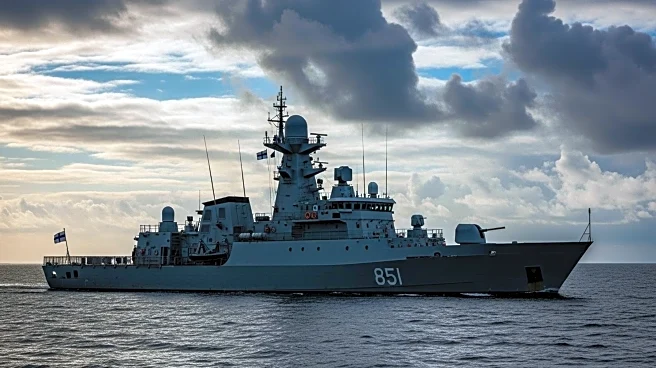What's Happening?
In a significant maritime security incident, Finnish Prime Minister Petteri Orpo authorized the interception of the tanker Eagle S, suspected of deliberately damaging undersea cables in the Baltic Sea. The incident occurred near Finnish territorial waters, where the Eagle S was tracked dragging its anchor across the seafloor, severing critical cables. This event is part of a series of at least 11 cable cuts in the Baltic, primarily affecting Finland, which shares a border with Russia. The Finnish Border Guard, suspecting deliberate sabotage, acted swiftly to intercept the vessel. The Eagle S, loaded with Russian gas, was en route to Egypt when it triggered alarms on Christmas Day 2024. Finnish authorities, including the Coast Guard and special forces, boarded the ship, marking the first such action since World War II. The ship's captain and senior officers have been charged with aggravated criminal mischief and interference with communications.
Why It's Important?
This incident underscores the growing tensions between Europe and Russia, particularly in the Baltic region, which is a critical corridor for energy and communication infrastructure. The deliberate damage to undersea cables poses significant risks to electricity and gas supplies, as well as digital communications, which are vital for modern economies. The involvement of a tanker linked to the Russian shadow fleet highlights the complexities of enforcing sanctions and the potential for hybrid warfare tactics. The Finnish response, supported by NATO's Baltic Sentry operation, signals a robust stance against such provocations, aiming to deter future incidents and protect critical infrastructure. The situation also raises concerns about the security of undersea cables globally, which are essential for international connectivity and commerce.
What's Next?
The case against the Eagle S's crew is ongoing, with Finnish prosecutors pursuing charges. The incident has prompted NATO to enhance its monitoring and defense measures in the Baltic Sea, aiming to prevent similar occurrences. The European Union, along with other Western nations, has imposed sanctions on the Eagle S, restricting its access to ports. This development may lead to increased scrutiny of maritime activities in the region and further diplomatic tensions with Russia. The international community will likely continue to monitor the situation closely, as it could have broader implications for regional security and energy supply stability.
Beyond the Headlines
The Eagle S incident highlights the strategic importance of undersea cables and the vulnerabilities they face from state and non-state actors. The use of a shadow fleet to circumvent sanctions and engage in potentially hostile activities reflects a sophisticated approach to hybrid warfare. This situation may prompt a reevaluation of maritime security policies and the need for international cooperation to safeguard critical infrastructure. Additionally, the incident raises ethical questions about the use of commercial vessels for military or sabotage purposes, challenging existing norms and regulations in international waters.









